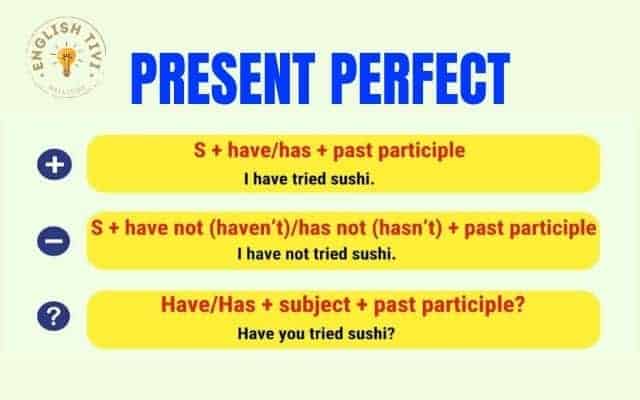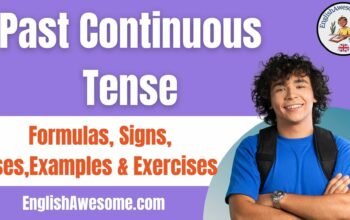Introduction
Present Perfect Tense is a verb tense that is used to show that an action has taken place once or many times before now. The present perfect is most frequently used to talk about experiences or changes that have taken place, but there are other less common uses as well. Read on for detailed descriptions, examples, and present perfect exercises.
⏩ Sign Up to Get Bonus
Present Perfect Tense is formed by putting “to have ( have or has )” before the past participle of the verb.
Structure of Present Perfect Tense
POSITIVE FORM (+) :
- S + have/has + V3/ed + O

Present Perfect Tense Examples:
- I have done my homework.
- She has had dinner with her family
- I have already prepared breakfast.
- My sister has cleaned the room.
- It has rained a lot lately.
- She has watched this movie several times.
- He has saved $20.000.000 up until now.
- They have gone fishing until later this evening.
- I have solved 20 questions so far.
- I have already made the coffee.
- You have already eaten four plums.
- I have lived in Texas for 10 years.
- Tom has just come to the office.
- The students have read that poem twice.
- I have never lied in my life.
- I have never been to Germany.
NEGATIVE FORM (-) :
- S + have/has + not + V3/ed + O
Examples:
- I haven’t done my homework.
- She hasn’t completed the assigned work.
- I haven’t seen Susan since Sunday.
- We haven’t received any mail since we were retired.
- I haven’t met before.
- We haven’t gone to watch the new movie.
- It hasn’t stopped.
QUESTION FORM (?) :
- Have/has + S + V3/ed + O?
Examples:
- Have you done your homework?
- Has she visited the children at the orphanage?
- Has the post come yet?
- Hasn’t my mother cooked the dinner yet?
- Have you ever been to England?
- Have you done the essay yet?
| POSITIVE(+) | NEGATIVE(-) | POSITIVE QUESTION (?) |
| I have seen. | I have not (haven’t) seen. | Have I seen? |
| I have seen. | You have not (haven’t) seen. | Have you seen? |
| He has seen. | He has not (hasn’t) seen. | Has he seen? |
| She has seen. | She has not (hasn’t) seen. | Has she seen? |
| It has seen. | It has not (hasn’t) seen. | Has it seen? |
| We have seen. | We have not (haven’t) seen. | Have we seen? |
| You have seen. | You have not (haven’t) seen. | Have you seen? |
| They have seen. | They have not (haven’t) seen. | Have they seen? |
Present Perfect Tense Uses
1. Present Perfect Tense is used to express an action that happened at an unspecified time in the past and the impact of the event is now continuing.
( Finished Auctions —-Past Event & Present Result )
Examples:
- She has lost her wallet ( She can’t find it )
- We can’t reach Paul by phone. Have you seen him?
- Tom isn’t at school. I think he has gone to the theater.
- My sister has broken her arm. Her arm is still broken.
2. Present Perfect Tense is used to express an action that ended recently. We often use words like “just” or “recently” for the events taking place a very short time before now.
( Recent Completed Actions )
Examples:
- I have just finished my project.
- My mother has just cleaned the house.
- We have recently eaten dinner.
3. Present Perfect Tense is used to talk about unfinished actions or states or habits that started in the past and continue to the present. In such sentences, it is emphasized that how long the action has continued. So we usually use ‘since’ or ‘for’ to express “how long”. We often use stative verbs / non-continuous verbs / mixed verbs in such sentences).
( Unfinished Actions / Duration from Past until Now )
Examples:
- The student has studied maths for three months.
- I have lived in Paris for five years.
- My son has been sick since Monday.
- He has worked in Berlin since he graduated from the university.
- She haven’t been calm since the accident.
- Teachers have thought this subject for hours.
- They have had many cars since I can remember.
4. Present Perfect Tense is used to express repeated actions in an unspecified time between the past and now.
( Repeated or Multiple Actions at Different Times )
Examples:
- We have watched that movie three times.
- I have seen David several times.
- She have had six exams so far this semester.
- They have called him four times this month.
5. Present Perfect Tense is used when we talk about life experiences.
( Life Experiences )
Examples:
- I have been to England in my life.
- Have you ever eaten Sushi before?
- We have never tried to invent something new.
6. Present Perfect Tense is used when we talk about accomplishments.
( Accomplishments )
Examples:
- My father has spoken five languages.
- Scientists have found a new way to get cancer cells to self-destruct.
- Man has walked on the Moon.
7. Present Perfect Tense is used when we talk about changes that has occurred over periods of time.
( Changes Over Time )
Examples:
- Our english has improved a lot when we moved to England.
- Her behavior and attitudes have changed a lot since you last saw her.
- I have become more interested in medical issues.
Recognition of Present Perfect Tense
The sentence contains the following words:
- Just, recently, lately
- Already, before
- Not….yet
- Never, ever
- Since, for
- So far = until now = up to now
Lesson: Present Progressive Tense
Difference Between For and Since
Sentence Structure: Since and For
Since and For are two prepositions used a lot in English grammar, especially in exams related to the past, simple past, and perfect tenses. However, how to distinguish these two prepositions and how to use them in each specific case?
Since and For are both used in sentences to express a point of time or a period of time. But each word is used in different circumstances.
+ How to use Since in English
Since is used to indicate a point in time when an event or action started to happen, indicating a point in time. Usually will answer the When question and use a lot of perfect tenses.
Example: Since 8 a.m, since July, since 2005,….
+ How to use For in English
For is used to refer to a period of time that an event or action takes place, lasting throughout that period of time. Unlike Since, the preposition for seems to be used in all tenses as well as in response to the question How long…?
Example: For 5 days, for a long time, for 5 years,…
Structure of Since and For
+ Since Structure Grammar
Since + timeline
When Since is in the middle of a sentence: Used to refer to a point in time when an event or action happened.
Example: He has been away since Monday.
When Since at the beginning of a sentence: Used to indicate a reason or just a point in time (since).
Example: Since she wanted to pass her exam, she decided to study well.
+ For Structure Grammar
For + period
Example: We lived in Japan city for 10 years.
| Since | For |
| 10 o’clock | three hours |
| Monday | 15 minutes |
| 20 June | two weeks |
| March | four days |
| 2021 | 5 years |
| Christmas | ages |
| lunchtime | 2 months |
| they came | years |
| she got up | a long time |
Ways to use Since and For
+ How to use Since
Since use in perfect tenses
| Tenses | Example |
| Present Perfect Tense | Jimmy hasn’t slept since last night. |
| Present Perfect Continuous Tense | I have been playing badminton since 6 o’clock. |
| Past Perfect Tense | I was sad when the store moved. I had worked there since I was 18 years old. |
| Past Perfect Continuous | He had been listening to that song every night since it started. |
Since + Simple Past Tense
Micky has liked reading since she was a child.
Since + Time in the past
I've lived here since 2021.
Since there
Since there, they have never met together again.
+ How to use For
Here is the usage of for in all tenses.
| Tenses | Example |
| Present Simple Tense | I play badminton for 2 hours a day |
| Present Continuous Tense | I’m watching TV for 1.5 hours |
| Present Perfect Tense | They have just slept for 15 minutes |
| Present Perfect Continuous Tense | He has been learning new vocabulary for 10 days |
| Past Simple Tense | I was born in 1995 |
| Simple Future Tense | He will go to the camp for 10 days |
Exercise of Present Perfect Tense
1. I …..(study) English for the last 10 years.
2. They…..(known) each other for 7 years.
3. I…..(sleep) for 30 minutes now.
4. How long you ….(learn) Chinese? I….( learn) it since 2021.
5. He….(buy) that car for 10 months.
6. I…..(sleep) for a long time.
7. We…..(live) here since 2019.
8. He already…..( read) that book for 4 months.
Answers
1. Have studied
2. Have known
3. Have slept
4. Have….learnt/ have learned
5. Has bought
6. Have slept
7. Have lived
8. Has read
Conclusion
Above is all helpful information about the present perfect tense. We wish you all good study!
In addition, you can refer such as English stories, grammar, … are constantly updated on Englishtivi.com.
Subscribe to the English tivi channel on Youtube to improve your English learning skills!





